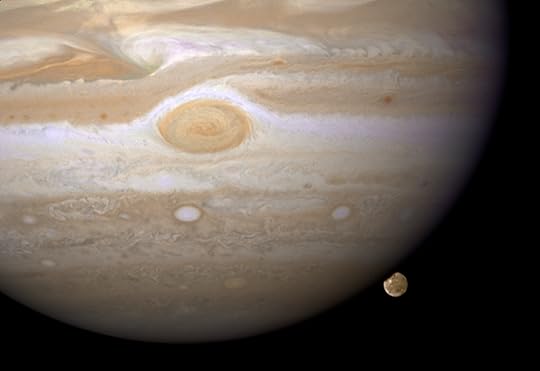“Soggy” Solar Systems: The ocean on Jupiter’s moon
Just weeks shy of its 25th birthday, the Hubble Telescope introduced us to yet another marvel in our solar system: a saltwater ocean beneath the icy surface of Jupiter’s largest moon, Ganymede. The discovery raises the possibility that Ganymede, or other bodies like it, could be habitable for humans.
Unlike a lot of moons, Ganymede has its own magnetic field, which interacts with space particles to create an ultraviolet glow around the moon’s poles. It also mingles with the magnetic field of neighboring Jupiter; resulting auroral shifts reveal clues about the planets’ internal composition. Hubble’s observations of this phenomenon indicated the presence of large amounts of salt water beneath Ganymede’s 95-mile thick crust. (View a great diagram here.)
Scientists estimate the ocean is 60 miles deep—ten times the depth of Earth’s oceans—and could hold more water than all Earth oceans combined. “The solar system is now looking like a pretty soggy place,” Jim Green, NASA’s director of planetary science, commented in a news conference. With watery worlds in our own solar system, who knows how many others lie beyond?

Ganymede peeks out from behind Jupiter
If you’re familiar with the premise of my upcoming novel Blue Karma , you’ve probably guessed my obsession with water. The thought of entire oceans on other planets enthralls me. Earthling biology assumes that water is a necessary factor for life (at least if we define life as carbon-based organisms like ourselves). Consider the bewildering array of plants and creatures that call our planet’s oceans home. Now multiply by ten. What might be swimming in the oceans of Ganymede?
The other consideration is habitability. Sure, Ganymede has oceans, and even a thin oxygen atmosphere, but its daytime surface temperatures range from -113C (-171F) to -183C (-297F). Not exactly prime real estate, climactically speaking. What about using the water to supply an orbiting space station? Or mining the water to supplement Earth (or heck, a colony on Mars)? Given our species’ dependence on H20, it’s fortunate that we live in a “soggy” solar system!
Read more about Ganymede’s oceans at NASA, Scientific American, and the BBC.




